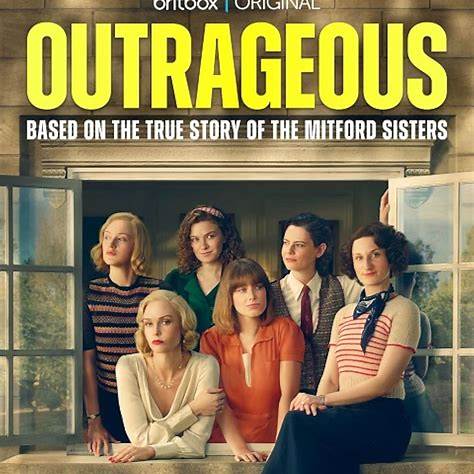Outrageous
A review of the ambitious historical drama that brings the scandalous intrigue of the Mitford sisters to vivid life
From the moment it begins, Outrageous immerses viewers in a lavish world of aristocratic excess, political fervor, and sisterly bonds that twist into ideological rifts. Set in the tumultuous 1930s, the series introduces the six Mitford sisters—Nancy, Diana, Unity, Jessica, Pamela, and Deborah—each determined to forge her own path amid a society bound by tradition and expectation.
Nancy, portrayed by Bessie Carter, serves as both narrator and emotional anchor with wit, insight, and a touch of weariness. The storytelling is playful one moment, perceptive the next, as Nancy’s voice bridges the emotional distance between her daughters’ divergent choices. We sense her internal struggle—between affection for her sisters and the horror of watching them embrace extremes of ideology.
Diana, played by Joanna Vanderham, captivates as the glamorous socialite who falls for Oswald Mosley, the notorious fascist leader. Her emotional rebellion against convention is both seductive and unsettling, a glamourous misstep that ripples through the family. In contrast, Unity—Shannon Watson—embraces radicalism with alarming zeal. Her idolization of Hitler and attraction to Nazism cast a chilling shadow over the communal façade and test the boundaries of familial loyalty.
On the opposite side of the spectrum, Zoe Brough’s Jessica rejects aristocratic privilege and embraces activism, drawn toward communist ideals and social justice. Her journey grounds the narrative in moral urgency and reminds us that rebellion is not always self-destructive but often rooted in empathy and purpose.
Under the light-touch direction of Sarah Williams, the series balances humor, style, and historical context. Its bright intertitles—like “That Damp London Flat” or “Diana’s Country Pile”—lend a self-aware, almost whimsical flair that tempers the heaviness of the sisters’ ideological betrayals. From country estates to elegant drawing rooms, the production design evokes both the opulence and fragility of interwar Britain.
Some critics have felt the show leans into caricature or employs an excessive amount of stylization to stay “modern and droll.” Yet the performances are grounded enough to anchor the tone. Bessie Carter’s Nancy is both charmingly wry and faintly exasperated, while Vanderham’s Diana undergoes a slow burn from amused privilege to stunned ideological entanglement. Jessica, Diana, Unity—each is crafted with distinct purpose and personality, their arcs woven together into a cohesive drama that feels rich rather than overcrowded.
The series arrives with an impressive approval rating—Rotten Tomatoes lists a strong 90% approval, reflecting broad acclaim for its compelling mix of politics, scandal, and personal conflict. Reviews from outlets like Willow and Thatch praise how the story positions historical dynamics as resonant and immersive, and viewers who appreciate nuanced drama will find themselves both entertained and provoked. There’s particular praise for how familial love clashes with political conviction, reminding us that personal relationships are often the loudest echoes of social upheaval.
Still, Outrageous does raise questions about its audience. Is this a primer for those curious about the Mitfords, or a reframing of their tales for contemporary sensibilities? The tone can feel like a high-wire performance—delicate, brilliant, and lightly unhinged.
In the end, the Mitford story has always been dramatic—filled with glamour, tragedy, outrage, and historical reckoning. Outrageous captures that complexity with enough stylistic flair to make it striking, and enough emotional heft to make it linger. It invites viewers into a world where devotion, dissent, and rebellion collide—and it keeps us watching, wondering what will become of these sisters next.
Black Mirror
A daring and relentless journey through the dark echoes of our digital age
From its inception, Black Mirror has been a chilling reflection—one episode at a time—of humanity’s unsettling relationship with technology. Created by Charlie Brooker, the anthology series presents individual stories set in near-future scenarios where gadgets, networks, and social systems morph into instruments of psychological and societal distortion.
There is no single protagonist, no recurring storyline—just standalone vignettes that thrill with their speculative premises and disturb with their familiarity. Episodes like “The National Anthem” paint social media as a modern spotlight whose glare can humiliate even the highest office, while “Fifteen Million Merits” and “The Waldo Moment” critique our obsession with spectacle and performative fame. These stories are bleak, sharp, and quietly prophetic.
Yet the series’ impact goes deeper than dystopian trepidation. It resonates as satire, horror, and psychological drama wrapped in devices we recognize—phones, screens, brain implants, virtual realities. And when it hits emotionally—like the hopeful romance of “San Junipero”—it lingers with profound warmth.
As it evolved, Black Mirror became a cultural bellwether. Its speculative ideas—about surveillance, bioengineering, social scoring—felt alarmingly prescient, even comforting in their exaggeration of real-world anxieties. In reviving the anthology format, the series became both a warning and a mirror, inviting viewers to ask: how close are we really?
In its most recent chapter, the show returns in a softer, more empathetic mode without sacrificing its critical edge. Episodes like “Common People” explore corporate overreach in wellness technology through fragile human stories. “Hotel Reverie” examines nostalgia, identity, and AI, even as it gambles on emotional beats inspired by earlier triumphs. In “Eulogy,” technology serves a quiet purpose—to channel grief and memory rather than amplify fear. “Bête Noire” reaffirms the series’ knack for unsettling paranoia, while “Plaything” misfires slightly in its refusal to fully land its fascination with artificial worlds.
Not every episode lands perfectly—Black Mirror is what it promises: provocative, speculative, uneven in the way all anthology storytelling is. But through its many versions of tomorrow, it has remained courageous, imaginative, and unafraid to show us a future we may already be writing today.




